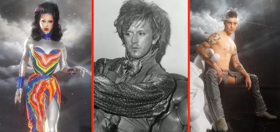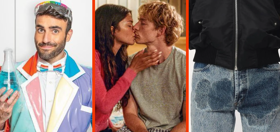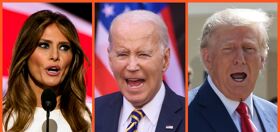 It’s one thing to read about history. It’s entirely different to watch it unfold. That’s the advantage of The Case Against 8, a new documentary currently playing in select theaters and debuting on HBO June 23. The film offers viewers a behind-the-scenes look at the legal team fighting to overturn California’s Proposition 8, which banned gay marriage in the state. It’s an unusual combination of personal stories (featuring the two couples who served as plaintiffs) and legal wonkery, as the attorneys plan their strategy.
It’s one thing to read about history. It’s entirely different to watch it unfold. That’s the advantage of The Case Against 8, a new documentary currently playing in select theaters and debuting on HBO June 23. The film offers viewers a behind-the-scenes look at the legal team fighting to overturn California’s Proposition 8, which banned gay marriage in the state. It’s an unusual combination of personal stories (featuring the two couples who served as plaintiffs) and legal wonkery, as the attorneys plan their strategy.
What The Case Against 8 is not is the definitive journalistic account about the Proposition 8 legal battle. If that’s what you’re looking for, you’ll be disappointed. If you’re looking for a feel-good account of the victory against Prop 8, the movie will be for you. As gay men, filmmakers Ben Cotner and Ryan White are consciously partisan in their approach.
“Ultimately, we weren’t trying to make a movie about gay marriage being right or wrong,” White told Queerty. “It’s the story of these characters’ journey.”
 There are essentially six characters in the story: the two couples who were the face of the case — Kris Perry and Sandy Stier, and Paul Katami and Jeff Zarrillo — and the two lead attorneys, Ted Olson and David Boies. The combination of Olsen and Boies was tailor-made for media attention because they were on opposite sides in the critical Bush-Gore election count dispute.
There are essentially six characters in the story: the two couples who were the face of the case — Kris Perry and Sandy Stier, and Paul Katami and Jeff Zarrillo — and the two lead attorneys, Ted Olson and David Boies. The combination of Olsen and Boies was tailor-made for media attention because they were on opposite sides in the critical Bush-Gore election count dispute.
How about we take this to the next level?
Our newsletter is like a refreshing cocktail (or mocktail) of LGBTQ+ entertainment and pop culture, served up with a side of eye-candy.
When Prop 8 passed, Cotner and White approached Chad Griffin, then of the American Foundation for Equal Rights about the possibility of filming the legal battle against it without any real sense of where it might head.
“You just sort of have to take that gamble.” White says now. “At the beginning we had no idea. They started to let us film because they believed part of their mission was letting people see the harms done by Prop 8. They ever told us to leave, and four years later we were editing the film.”
What White and Cotner ended up with was 600 hours of footage. Because of they were aware how sensitive the topic was, and in the case of the couples, how personal, they shot all of the footage themselves, which they promptly placed in a safe deposit box without reviewing it.
When the time came to assemble the film, “it was a rediscovery process,” says White. “We remembered the great moments.”
 The film aims to strike a balance between the personal stories of the plaintiffs and the legal strategy. White and Cotner were well aware that the latter presented more of a challenge for viewers.
The film aims to strike a balance between the personal stories of the plaintiffs and the legal strategy. White and Cotner were well aware that the latter presented more of a challenge for viewers.
“It was tough for us to figure out how much to go into detail on legal issues,” says Cotner. “There were so many fascinating things about discovery of documents, and the standing issue [whether outside groups could defend the law if the state would not] was complicated to explain.”
Your level of interest in the legal strategy might depend on whether you are, in White’s words, “nerdy about law.” What is undeniable grabbing are those parts of the film about the two couples. As the film–and the years–progress, the viewer gets to know them and the impact that Prop 8 has on their lives.
The couples are sympathetic plaintiffs and went through an extensive process before being selected, including an investigation of their background. Perry and Stier have been a couple since 1997 and are raising four boys. Perry heads a nonprofit that advocates for funding for early childhood education, while Stier heads IT for a Bay Area government agency. They tried to marry in 2004, only to have their marriage voided once Prop 8 passed.
 Katami and Zarillo, who also spoke to Queerty, have been partners since 1998. Katami is a fitness expert and small business owner, while Zarillo is general manager of a theater exhibition company. The pair considered a variety of options for getting married, including travel to other states, but held out for marrying in California, where they live.
Katami and Zarillo, who also spoke to Queerty, have been partners since 1998. Katami is a fitness expert and small business owner, while Zarillo is general manager of a theater exhibition company. The pair considered a variety of options for getting married, including travel to other states, but held out for marrying in California, where they live.
Being followed around by cameras wasn’t easy to start. “We were a little nervous in the beginning,” admits Zarillo. “The directors were always so kind and respectful of what we were going through.”
Despite being integral to the case and the documentary, Katami and Zarillo say that watching the film was informative for them.
“It was interesting for us watching it,” Zarillo says now. “We spent so much time in prep sessions, we didn’t really get to see a lot of the strategy sessions and meetings with lawyers. It was interesting for us to see the conversations in the conference.”
It wasn’t just the cameras that took some getting used to. There was also the idea that they would have to appear in court. “I don’t think anyone really expected there to be an actual trial,” says Katami. “When we first signed on, it was meant to be a series of motions by the court.”
It was only when Judge Vaughn Walker, who himself is gay, was assigned the case that he decided on a trial, which forced supporters of Prop 8 to produce expert testimony. (That ended badly for them.) “No one expected that to happen,” says Katami. “That was the very first big twist in the story.”
Another major twist in the story is the admission by one of Prop 8 supporters that he was wrong. In an on-camera interview, David Blankenhorn recounts how he changed his mind on the witness stand and then in print in The New York Times. The interview not only humanizes the other side, but also shows how reasonable people can come to change their minds.
Unfortunately, Blankenhorn’s appearance is an isolated case. None of the other opponents of marriage equality appear, except as stock villains. Partly that was a conscious decision. Partly it was the terms the filmmakers agreed to. In getting unlimited access to the legal team fighting Prop 8, they gave up the possibility of contemporaneous interviews with the other side.
“It was not possible because of confidentiality to be on both sides,” says White. “We just wanted to tell the story of one particular group of people.”
That group is headed up by Chad Griffin, then of American Foundation for Equal Rights, for whom the documentary serves as a virtual infomercial. Where the film really falls short is in letting Griffin serve as the voice of the entire marriage equality movement. He and colleague Kristina Schake take a few swipes at unnamed lawyers who question their approach (you know who you are, Evan Wolfson). Uninformed viewers will think that the anti-Griffin forces are just weak sisters and that only Griffin has the will to push this case forward.
That implication is wrong. There were valid reasons to be concerned that the Prop 8 case could result in a legal ruling that would set back marriage equality for years. In retrospect, that seems a foolish fear, but that discounts the astonishing speed with which the nation has changed its opinion. In 2009, a positive court ruling was not guaranteed.
No one gets to express those messy concerns in the film. Costner and White say that they had more along these lines in the film, but took it out because, when “when we tested it [with audiences] it was hard to explain in the footage.”
Similarly, the film notes that Olson was a controversial choice for the case. However, because Griffin ascertains that Olson is serious, other lawyers who were working on marriage equality are dismissed for being small-minded.
In fact, there was reason to question Olson’s interest in the case. While everyone knows that he was the lawyer who represented George W. Bush in the dispute over the Florida election results in 2000, he was also Bush’s Solicitor General.
In other words, he worked for the man who won re-election by using opposition to marriage equality to turn out the vote in key states. While Olson didn’t work on the re-election campaign, it remains a legitimate red flag that goes unmentioned. It doesn’t help that Olson’s sudden conversion to marriage equality is presented as a given and never explained.
The documentary presents Olson and Boies as legal demi-gods, and they are undeniable brilliant lawyers. But they didn’t start from scratch. (They also were paid $6.4 million for their efforts.) They had the advantage of being able to draw on the legal groundwork done by attorneys who were laboring in the vineyards of marriage equality long before it was popular. Those lawyers get badmouthed by Griffin, but they are never credited for their hard work.
By the end of the film, the Supreme Court decisions merge into one big happily-married ending. From the legal perspective, however, it was the Windsor decision that carried the day and is the one cited by all the subsequent court rulings in favor of marriage equality. The Prop 8 ruling was in favor of the plaintiffs, but because only because the Court ruled that the initiatives supporters lacked legal standing in court
These are many of the same issues that bedevil Forcing The Spring by Jo Becker, who not coincidentally had the same type of access to Griffin, Olson and Boies. (Memo to Freedom to Marry and the ACLU: This is a lesson in PR 101.) White and Cotner are aware of the controversy that surrounds that book, they insist that they know they are only telling part of the story.
“We hope other filmmakers are covering as many chapters of these stories as they can,” says White.
By the time you get to the end of the film, you can’t help but feel happy for the couples. Right after the Supreme Court ruling, both couples got married. For Kamati and Zarillo, it was the end of a long journey.
“We’re just two guys from Burbank who fell in love and had the same desire to be married as one else and not have to go through a court challenge to get there,” says Katami. “It was kind of a selfish thing we wanted for ourselves that became a battle.” (Katami and Zarillo have signed with a speaker’s bureau to bring their story to college campuses. You can follow them on Twitter @katamizarillo.)
Weddings are always where Hollywood films end, and this is no exception. But in the end, The Case Against 8 is as much a Hollywood film as it is a documentary. The victory is sweet, particularly for the couples. But Hollywood likes things neat and tidy, and The Case Against 8 doesn’t really have any of the messiness or context that characterize history. For that, you’ll have to wait in hopes that someone does capture it one day. In the meantime, if you’re in the mood for something more celebratory, The Case Against 8 is the perfect flick.



















DarkZephyr
Oh the irony of accusations of one-sidedness coming from Queerty.com. Oh Queerty. *Patting Queerty on the head*
enfilmigult
Best thing I’ve read on Queerty in a long while; I was expecting a glorified ad, but this is an honest-to-goodness review! Bravo for neither giving this film’s flaws a pass just because it has its heart in the right place, nor dismissing it altogether just because it *has* flaws. Interesting read for sure.
zaneymcbanes
Very well put, Mr. Gallagher.
mz.sam
Great article and a welcomed serious journalism from Queerity. Would be nice to see more like this.
Dev
Seeing as how the film is titled THE CASE AGAINST 8, I think it’s pretty clear for anyone watch what the intended POV is. It’s not about suits in other states. It’s Prop 8 in California.
jar
Lambda, Evan Wolfson, and the gay legal rights orgs have adopted the cowardly- we need to wait for the perfect case and now is not the time, we’ll create a bad precedent- since the 80’s. Right up until the Windsor case, they still wouldn’t budge from their small bourgeois approach. They were never true advocates, as their paltry results demonstrate. It’s notable that it was when the advice of Wolfson and the lot were outright ignored that we got the results of last summer. They should be and will be forever more marginalized for their impotence.